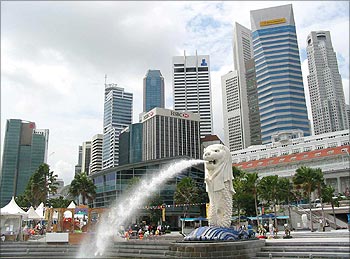Photographs: Jay Mandal/On Assignment/Rediff Archives
The recession has transformed the global map of the world's wealthiest people, with Europe nudging out North America as the richest region, according to a study by The Boston Consulting Group (BCG).
Global wealth fell from $104.7 trillion in 2007, measured in assets under management (AUM), to $92.4 trillion in 2008, a fall of 11.7 percent. It was the first decline since 2001.
The number of millionaire households worldwide fell from 11 million to about 9 million -- a drop of 17.8 percent.
The decline was steepest in North America and Europe, at 22 percent in both regions, although the United States continued to have the most millionaire households -- nearly 4 million.
It's no longer raining millionaires!
Image: Singapore has the highest concentration of millionaires.It declined in all other segments. Among households with more than $5 million in AuM, wealth fell by 21.5 percent.
Singapore had the highest concentration of millionaires, with 8.5 percent of the country's households owning more than $1 million.
It's no longer raining millionaires!
Image: Kuwait, home to many millionaires.The steepest decline was in North America, where wealth plummeted by 21.8 percent last year.
In North America, the share of wealth held in equities fell from 50 percent in 2007 to 38 percent in 2008 - but the region still had the highest proportion of wealth held in equities.
Europe had $32.7 trillion in AuM, down 5.8 percent from the previous year, followed by North America, with $29.3 trillion in AuM.
Latin America was the only region where wealth increased - its AuM grew by 3 percent in 2008.
It's no longer raining millionaires!
Image: Wealth to see slow recovery in 2010 ."Wealth will begin a slow recovery in 2010 but may not reach its pre-crisis level until 2013," said Peter Damisch, a BCG partner and a coauthor of the report.
"We expect wealth to grow at an average annual rate of about 4 percent from year-end 2008 through 2013."
Wealth will grow fastest in Asia-Pacific (excluding Japan) at 9.5 percent per year over the same period, he added.
Offshore wealth fell to $6.7 trillion in 2008, down from $7.3 trillion in 2007. Switzerland remained the largest offshore center. It accounted for $1.8 trillion, or 28 percent, of offshore wealth last year.
It's no longer raining millionaires!
Image: More scrutiny over wealth.Increased regulatory scrutiny is changing the landscape of cross-border wealth management, with pressure mounting on offshore centers that have based their edge primarily on tax avoidance.
"Once their tax and legal advantages evaporate, so too will their appeal," Damisch said. "Being inconspicuous is a tenuous value proposition in an era of increasing oversight."
Some non-traditional offshore centers - including several outside Europe - remain poised for growth. Singapore and Hong Kong, in particular, will continue to benefit from their proximity to other Asian countries, where wealth is expected to stage a faster recovery.
"Iconic offshore centers, like Switzerland, will remain competitive, but even the most venerable institutions will need to emphasise their underlying capabilities as international wealth managers," said Damisch.
It's no longer raining millionaires!
Image: Wealth management industry better than financial services sectors.The wealth management industry has weathered the storm better than most other financial services sectors, but it was hardly unscathed.
Among the 124 institutions in BCG's benchmarking study, the median pretax profit margin fell to 30.0 percent in 2008, down from 36.4 percent in 2007.
Performance was dampened by client behaviour. Stung by losses and scandals, clients shifted their assets to basic, low-margin investments.







article